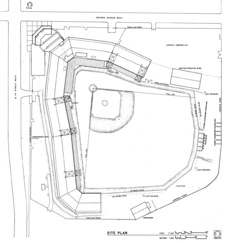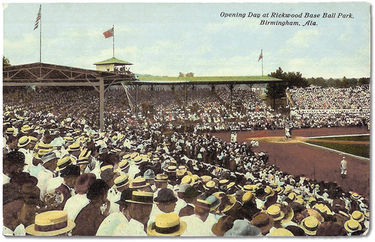Rickwood Field
Rickwood Field, located at 1137 2nd Avenue West, at the corner of 12th Street West in West End, is the oldest surviving professional baseball park in the United States. It was built for the Birmingham Barons in 1910 by industrialist and team-owner Rick Woodward and served as the home park for the Barons and for the Birmingham Black Barons of the Negro Leagues. The Barons moved their home games to the Hoover Metropolitan Stadium in 1987. Since then, Rickwood Field has been preserved and is undergoing gradual restoration as a "working museum" where baseball's history can be experienced.
History
The Birmingham Coal Barons baseball team began playing professionally in 1887, with their home games at an informal park called "Slag Pile Field" in West End. In 1901 they joined the Southern Association.
A. H. "Rick" Woodward, chairman of Woodward Iron Company and grandson of pioneer Birmingham industrialist Stimpson Harvey Woodward, purchased a majority share of the Birmingham Coal Barons baseball team from J. William McQueen in 1909 while he was still in his 20s. Immediately he began planning a grand showplace for his new team. He contacted Connie Mack for advice on the details, including the field dimensions. He settled on Forbes Field in Pittsburgh and Shibe Park in Philadelphia (later renamed Connie Mack Stadium) as the models for the new park. He purchased land in the West End neighborhood of Birmingham from the Alabama Central Railroad. The $75,000 structure was designed by Southeastern Engineering Company of Birmingham (a short-lived subsidiary of Pittsburgh's General Fireproofing Company) and completed during the summer of 1910. The 12.7 acre park was flanked along the basepaths by concrete and steel stands. A tile-roofed cupola on the roof behind home plate provided space for the announcer and the press. Woodward named the field after himself, using his nickname and the first part of his last name.
Opening day on August 18, 1910, was celebrated by businesses closing all over town to allow fans to fill the park for the first pitch at 3:30 P.M. Over 10,000 people attended that first game in which the Barons defeated the visiting Montgomery Climbers 3-2. Throughout the first half of the 20th century Rickwood Field hosted sellout crowds for the Barons and the Black Barons who played on alternate weekends.
In 1912 a spring tornado tore through the field, pulling up the outfield fence. Two years later Woodward felt the need to have electric fans installed in the grandstands for the comfort of the crowd.
During the 1920s Rickwood Field also hosted college football games. In 1921 the outfield fence was damaged in a tornado and quickly rebuilt. In 1924-1927 the infield bleachers were covered with a steel-framed roof designed by Denham, VanKeuren & Denham, Architects of Birmingham. Shortly after, In 1928 a new Mission style entry structure with offices was built to the designs of Paul Wright & Co., Engineers of Birmingham. A new concrete outfield wall replaced the original fence.
In 1931 in the first game of the Dixie Series championship, Birmingham's 43-year-old Ray Caldwell outpitched 22-year-old Dizzy Dean, who had guaranteed a win. The Barons won the series 4 games to 3. In 1936 four monumental steel-frame light towers designed and fabricated by the Truscon Steel Company of Youngstown, Ohio were erected, allowing for night games. In 1938, Woodward sold the park to Ed Norton, a local businessman. In 1940 Norton sold it to the Cincinnati Reds. At that time new outfield fences were built inside the original walls to reduce the field dimensions. G. J. Jebeles of Birmingham purchased the park in 1944. A ladies' rest room was added and the outfield fence reduced again in 1948. In 1949 ownership changed hands again, going to a partnership of Al DeMent, Al Belcher, and Rufus Lackey. They added a small restaurant in the entrance building in 1950 and installed additional box seats, necessitating the relocations of the dugouts farther down the baselines. In 1958 Belcher gained a majority share and control of the park.
Following the 1961 season, the Southern Association folded and, for the first time in 52 years, there would be no professional baseball at Rickwood. In 1963, Belcher teamed up with Kansas City A's owner Charley Finley to bring the Barons back for the 1964 season as a AA team in the newly-formed Southern League. In 1964, General Manager Glynn West purchased 1000 wooden seats from New York's Polo Grounds and installed them at the park.
After declining attendance in the 1965 season, Belcher suspended play for the 1966 season, and Finley transferred his AA franchise to Mobile. Belcher sold Rickwood Field in 1966 to the City of Birmingham, but retained a lease for the remainder of that year.
Later in 1966, the lease was transferred to Charlie Finley, who brought Kansas City's AA farm team back to Birmingham for the 1967 season, with the caveat that the team would now bare the moniker of its parent club. This followed a trend which swept minor league baseball (and which has since been largely reversed), and so professional baseball had a new face at Rickwood in the "Birmingham A's". That year is also remembered for the day that 14,000 disappointed fans were sent home early when the Atlanta Braves vs. Southern League All-Stars exhibition game was called "on account of tornado."
After increasingly dismal attendance numbers, the [now] Oakland Athletics ended its affiliation with Birmingham following the 1975 season, and professional baseball would not return to Rickwood for six years. Between 1979 and 1980 the wooden seats were replaced with plastic seats in the box areas and metal bleachers under the grandstands.
In 1981 Art Clarkson brought minor league baseball back to Rickwood. Clarkson purchased the Detroit Tigers' AA affiliate Montgomery Rebels in the Southern League and moved them to Birmingham, renaming them the Barons. Clarkson also had a new electronic scoreboard installed at the park. The Barons would change affiliations in 1985 to the Chicago White Sox, and would remain in Rickwood until 1987.
In 1987 the Barons moved to the new Hoover Metropolitan Stadium, in the suburb of Hoover.
Current status
Since 1992 the ballpark has been under the care of the Friends of Rickwood who are slowly but surely restoring each part of the facility while also hosting frequent amateur, police and semi-pro games and opening the gates to frequent visitors who can walk in any day and explore the grandstands or run the basepaths.
Every summer since 1996, Rickwood Field has hosted the Barons for a "throwback game" in which both teams wear period uniforms. Each Rickwood Classic has honored a different era in Birmingham baseball history.
Scenes from the films Cobb (1994) and Soul of the Game (1995) were filmed at Rickwood Field. Those productions contributed to the recreation of the scoreboard and pressbox, and the addition of 1940s period style advertisements on the outfield fence. Some of these retro-style ads have been sponsored by real Birmingham businesses, including a section sponsored by the descendents of Rick Woodward advertising long-gone Woodward Iron Co. The outfield signs were designed by Ted Haigh, a Los Angeles-based graphic designer and executed by Skidmore Sign Company of Birmingham.
So far (2005), the Friends of Rickwood have spent around $2 million refurbishing the grandstands, pressbox, locker rooms, roof and main entrance to the park. Future plans include establishing a Museum of Southern Baseball.
ESPN Classic broadcast a re-enactment of a Negro League game played at Rickwood on February 26,2006. It featured teams wearing the uniforms of the Bristol Barnstormers and Birmingham Black Barons.
References
- "Rickwood Field." Wikipedia, The Free Encyclopedia. 19 Mar 2006, 07:01 UTC. 19 Mar 2006, 07:04 [1].
- Benson, Michael (1989). Ballparks of North America: A Comprehensive Historical Reference to Grounds, Yards, and Stadiums, 1845-Present. McFarlands. ISBN.
- Wainwright, Paige. (Fall 1995) “Rickwood Field: Grand Old Lady of Baseball.” Alabama Heritage.
- Whitt, Timothy (1995). Bases Loaded with History: The Story of Rickwood Field: America’s Oldest Baseball Park. Birmingham, Alabama: R. Boozer Press. ISBN 0963612816.
- United States Geological Survey (2006). "Rickwood Field". Retrieved February 1, 2006. [2]
- Cook, Ben (2005). Good Wood: A Fan's History of Rickwood Field. Birmingham, Alabama: R. Boozer Press. ISBN 0-9636128-3-2
External links
- Rickwood Field (Friends of Rickwood) website
- Rickwood Field at Baseball Pilgrimages.com
- Historic American Building Survey - search for "Rickwood"
- Stadium Views - Ball Parks of the Minor Leagues
| Dual licensed with the Creative Commons Attribution Share-Alike License version 3.0 | |
| This article is published under the GFDL and the Creative Commons Attribution Share-Alike license v3.0. | |

